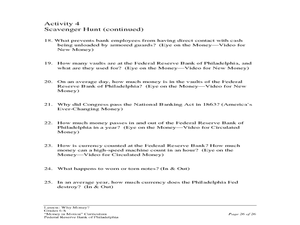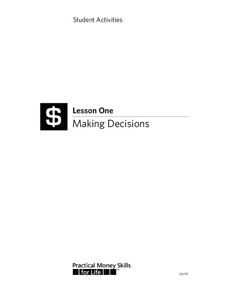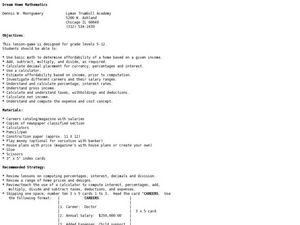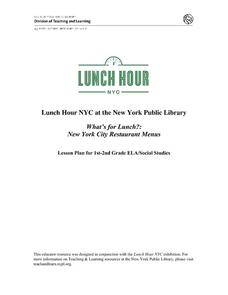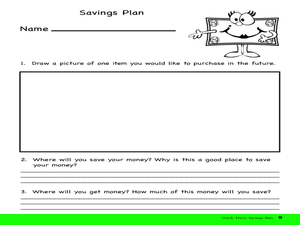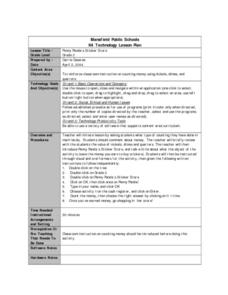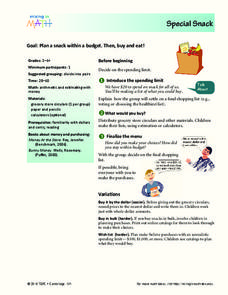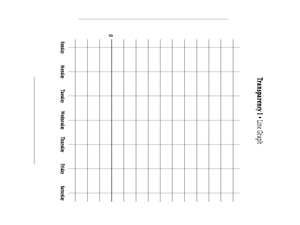Curated OER
Party Math
Young scholars create a spreadsheet that they will use to plan a small party or outing. They calculate expenses and stay within a budget amount for their party.
Curated OER
Count And Add Nickels
This math lesson focuses on coins - specifically the nickel. Students use plastic nickles in order to gain practice counting by fives, and adding amounts of cents. Students complete a worksheet where they tally up different amounts of...
Curated OER
Why Money?
Students participate in a trading simulation to learn about barter and the benefits of using money. In this barter lesson plan, students participate in a trading simulation and learn about coincidence of wants. Students then use money...
Curated OER
Taxes: Where Does Your Money Go?
Young scholars explore the concept of taxes. In this tax lesson, students investigate types of taxes and deductions taken out of a paycheck before they see it. Young scholars calculate the tax on a given dollar amount. Students...
Curated OER
Shared and Guided Reading with Ice Cream Money
Here is a lesson plan which has young scholars locate an exclamation point and a comma from the text. They locate previously learned words on the page, and create a word map from the word "Money." Students write about and illustrate...
Visa
Making Decisions
What economic factors can influence personal and financial decisions? In an effort to understand opportunity costs and the time value of money, pupils engage in role-playing activities and discussion, as well as view a PowerPoint...
101 Questions
Dollar Wall
Money doesn't grow on trees—it grows on walls. Using pictures of a Guggenheim art installation consisting of one-dollar bills glued to a wall, future mathematicians consider the monetary value of the bills used in the installation....
Curated OER
Dream Home Mathematics
Explore the concept of budgeting with sixth graders. They will pick a career on note card made by the teacher. They then use the information on the card such as salary, expenses, and career to create a life for themselves. They also...
New York Public Library
What's for Lunch?: New York City Restaurant Menus
Do you remember the days when a cup of coffee cost five cents? At A.W. Dennett restaurant in 1894, you could buy a five-cent cup of coffee and as well as a five-cent slice of pie to accompany it. The menu from that year is a primary...
Curated OER
Making Choices
Second graders explore financial decision making. In this introductory economics lesson, 2nd graders listen to the book Alexander, Who Used to be Rich Last Sunday by Judith Viorst, and discuss making financial choices based on wants and...
Curated OER
Making Change
Second graders explore how to incorporate a new type of technology, the cash register and/or a calculator, as a motivational tool for solving real life problems. They practice estimating money and counting back change from $20.00.
Curated OER
How Much Is It?
Students explore foreign currencies. In this foreign currencies lesson, students simulate travel to another country and determine the value of the US dollar compared to other countries. Students use a conversion table and search Internet...
Curated OER
Common Sense Cookie Shop
First graders shop for a bag of cookies using toy money. In teams, they choose which variety to buy and decides which bills and coins are necessary to buy the bag of cookies and a cashier makes change. They tally the cookies purchased...
Curated OER
Having a Savings Plan
Young scholars discover the importance of saving and spending. In this finance lesson, students read the book Kermit the Hermit and discuss the differences between needs and wants. The young scholars complete worksheets concerning money...
Curated OER
Saving and Investing
Fifth graders participate in activities to promote understanding of investing and saving. In this saving and investing lesson, 5th graders design a portfolio, play a card game and write a skit about the importance of investing.
Curated OER
Penny Panda's Sticker Store
Second graders practice counting money using nickels, dimes, and quarters. They review the value of nickels, dimes and quarters. They explore Penny Panda's Sticker Store, and talk a little about what the object of the activity is (save...
Curated OER
Short-Term and Long-Term Savings Goals
Fifth graders discover how saving money can apply to their lives. In this personal finance lesson, 5th graders use the book The Leaves in October, as a conversation starter on income, savings and setting goals. Students explore the...
Curated OER
Special Snack
Students explore grocery store circulars to choose items for a snack. In this snack math lesson, students must plan a class snack for $20.00. Students create a list estimating costs. Students view lists and choose one for their class. ...
Curated OER
Million Dollar Project
Students calculate how they will spend a million dollars. In this millionaire math lesson, students complete a worksheet and then make a poster of how they would spend a million dollars. Each item and its cost must be shown. a minimum...
Curated OER
Less Than Zero
Students keep track of money. In this money management lesson, students read Less Than Zero by Stuart J. Murphy and manipulate a number line to keep track of spending and borrowing in the story.
Curated OER
Rounding Decimals
Fourth graders explore rounding a price given in dollar and cents to the nearest dollar. In this math lesson, 4th graders discover how to round to the nearest dollar. Additionally, students practice rounding money for objects that they...
Curated OER
The Hundred Penny Box
Students compare how people save money in financial institutions, after reading the story, The Hundred Penny Box. They analyze the advantages of regular saving and how savings grow with compounding.
Curated OER
Exquisite Excursions
Students locate 6 cities, one on each of the 6 major continents. They find distance for each leg of their journey, convert to percents, use a time zone map, and convert to foreign currencies.
Curated OER
A Penny Saved is a Penny Earned
Students explore the concept of exponential growth. In this exponential growth lesson, students manipulate power models with base 2. Students discuss what would happen if you doubled a penny over the course of 20 days. Students graph...




